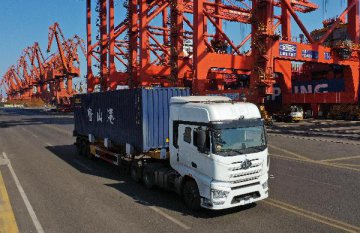WASHINGTON, June 24 (Xinhua) -- A U.S. hearing on a proposed new round of tariffs on some 300 billion U.S. dollars in goods from China entered the second week on Monday, after hundreds of witnesses in the past week had presented their views to trade officials about their opposition to protectionist measures.
The hearing on Monday, held by the Office of the U.S. Trade Representative (USTR) at the International Trade Commission, is scheduled to be attended by business and industry representatives from various sectors, including fragrance, toy, cooking equipment, and apparel and footwear.
Farah Ahmed, president and CEO of the Fragrance Creators Association, said in written comments that applying tariffs on the association's members "will discriminately hurt small business and U.S. consumers by raising prices for inputs that can only be sourced from China and are used to manufacture goods used by practically every American."
The U.S. trade group consists of developers, creators and manufacturers for home care, personal care, fine fragrance, industrial, and institutional products. Out of its nearly 70 member companies, approximately 50 are small businesses.
"The proposed tariffs threaten manufacturing jobs in those businesses as well as those in downstream manufacturing operations," according to Ahmed. "If tariffs are enacted, members will be forced to absorb the increased costs and face cut-backs in additional investment, delay essential business activities such as research and development and employment, or pass the extra costs on to consumers."
Hasbro, a U.S. toy maker of 93 years, said that the nation's toy industry is "uniquely exposed to the proposed tariffs on products from China because, industry-wide, 85 percent of all toys sold in the United States are imported from China."
"The required production capacity and toy safety expertise does not currently exist outside of China and it would take several years to develop," Hasbro said in its comments to the USTR.
The ongoing hearing will conclude on Tuesday.
The proposed new tariffs of up to 25 percent on Chinese imports are based on the so-called findings in the USTR's investigation of China under Section 301 of the Trade Act of 1974, a one-sided tool for Washington to serve its own interests in dealing with trade disputes with other economies.
Twenty-five percent tariffs on some 250 billion dollars' worth of goods from China are currently in effect under a Section 301 tariff action. In response, China raised additional tariffs on a range of commodities from the United States on June 1.






















Latest comments